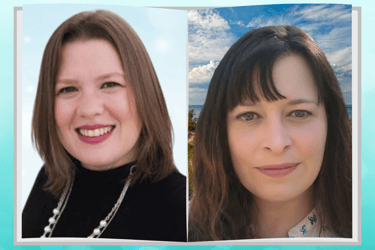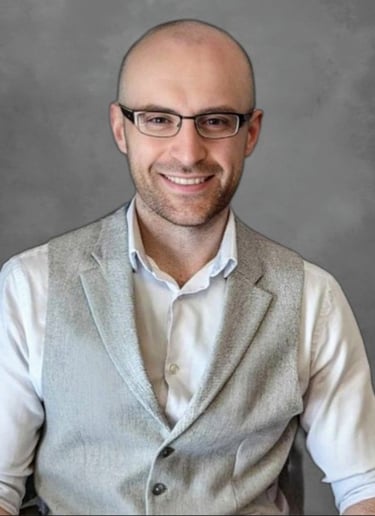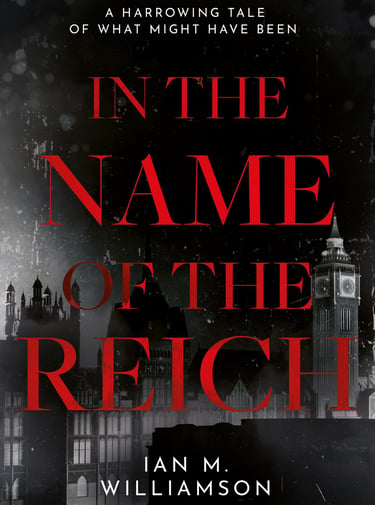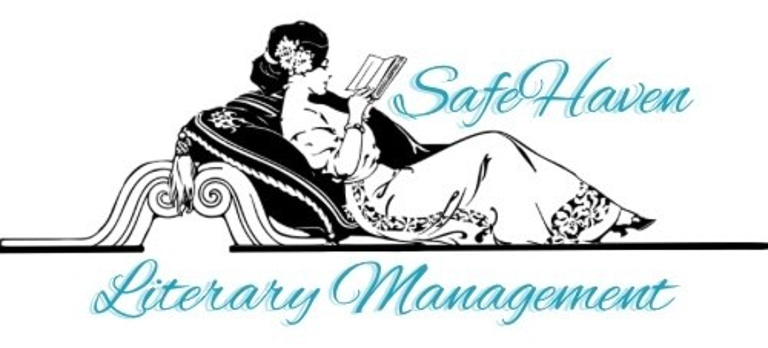In our weekly feature, we will take you behind the scenes with some of the talented authors who have been interviewed on Beyond the Pages by Deb McIlroy & Erin Shea on our YouTube channel. Get a glimpse into their creative process, inspiration, and the stories behind their stories. Stay tuned for exclusive insights and anecdotes from the minds behind some of your favorite books.


What was your motivation for writing your latest book? Can you elaborate on the process behind it?
I've always had the itch to write. I wrote a fantasy book when I was a teenager that will never see the light of day, and I've written poetry and short stories over the years that are published online. So, something bigger was just a natural conclusion for that urge to write.
And I’ve always been a fan of the alternate history genre, and particularly the “what if?” the Nazis won the war question. I studied history at university, and this whole era was a huge part of it. But I’d never seen this question posed from this perspective before: from the perspective of a character who has been raised in this world and subjected to so much propaganda since early childhood that he is relentless in his dedication to the National Socialist ethos. As far as I am aware, it has never been done.
I finished the first draft after about 3 years of writing, and I knew I had something quite unique – it just needed so much editing and rewriting, and redrafting that it took me another 5 years to get it into the shape it is in today. Over time, I cut about 40,000 words and changed the final act almost entirely, and just honed my writing style. But the idea that there was something good there, and that it actually had something to say about society, etc., if I could only get it right, was a big motivator to keep me going.
This week, we have the pleasure of chatting with Ian M. Williamson, the talented author of In The Name Of The Reich.
Could you describe your writing routine and how you maintain focus and creativity throughout the process?
My writing routine varied quite drastically depending on the stage I was at.
When completing the initial draft, I was happy to take my time and let it percolate. There was no rush because there was no deadline – it was more a hobby than anything else – so I could keep to no particular schedule and slowly chip away at it over several years, and let creativity just come naturally.
When it came to the editing, however, I became much stricter with my time. For the final edit, for example, I used every spare minute in the day to write – it was 4/5 hours after work every day, and up to 14 hours days at the weekends, over a three-month period. I was on a deadline, and getting it “perfect” became an obsession. It was not a healthy routine, but at that point I did not have to maintain focus – it was just there.
Which themes resonate strongly in your writing, and what draws you to these particular themes?
I like to think that this story is packed with interesting themes: the effects of propaganda and disinformation, the dangers of conformity, the darker side of human nature, the fragility of democracy, the threat of fascism and totalitarianism. An interest in these themes came naturally from having studied 20th-century history, and from watching how global politics has developed during my own lifetime – they reoccur over and over again throughout the past 125 years, and it is simply impossible to ignore them.
I’m also drawn to them because they are uncomfortable themes to confront, and more than anything else I wanted to create something that will challenge the reader.
What is your approach to crafting character arcs, and how do you ensure that they are relatable to readers?
I had no approach to character arcs when I first began writing In the Name of the Reich – which is one of the reasons it took me so long to write it, as I had to find the characters as the story progressed. It was not an ideal way to write, but I do think it allowed the characters a freedom to almost find themselves on the page.
Making the protagonist, John Highsmith, relatable was my biggest challenge throughout the book. He is a British-born Detective Sergeant in the Metropolitan Police who is tasked with stopping a drug called “Yonder”, which is an apparent threat to the British public. He is a young, well-meaning, hard-working father-to-be who wants nothing more than to do his job to the best of his ability and protect society from what he perceives to be a threat to its safety.
He is also a dedicated National Socialist: a badge-wearing, flag-waving Nazi. And I do not shy away from the obvious, horrific ideologies that would come with being raised under Nazism.
So, how to make him relatable.
I used a lot of my own personality in John to build a character who seems real, so a lot of his anxieties and internal struggles are my own, amplified for dramatic effect and then placed into this scenario of a police officer. And I went to lengths to make sure he is flawed. The key was then weaving in this other, darker side of his character – the National Socialist and the Nazi – in-between what I perceive as "normal" characteristics. In doing so, I tried to create this duality for the protagonist, which drags the reader’s sympathies back and forth until the final page.
What has been the most surprising or rewarding part of your writing journey so far?
There have been a few rewarding moments so far: sending off the final draft to the publisher, holding the physical copy for the first time, overwhelmingly positive responses to the final book from family and friends, and online reviewers.
But the most rewarding part has been giving my father a physical copy of the book. He is a big reader and is big into his history, and was always so supportive of my own work, even when he read the first draft over 5 years ago, when it simply was not very good. So being able to give him a physical copy of the final, printed book was one of the proudest moments of my life.
What are the common misconceptions people have about being a writer that you would like to address?
That writing is something you can just sit down and “do”. It has to be a passion, and something you put your heart and soul in to – otherwise the work will not flourish, and it will be apparent to the reader that you did not care as much about the project as you ought to have done.
What advice would you give aspiring authors when it comes to writing?
In terms of traditional publishing, I never regretted the time I spent pursuing an agent. It helped me to refine certain aspects of my work, such as the blurb and the pitch, and having them in good condition was to my benefit at a later stage. And whilst I never did get anywhere with traditional publishing, I would advise prospective authors not to be disheartened should they face the same rejection – that game is so difficult to play, and in the end it may not actually be the most prosperous route for your work.
When I decided I was going to go the self-publishing route, the key for me was finding a publisher who, I felt, was passionate about my work. It was a lot of research, and I spoke with several, but in the end, it was apparent that Troubador was the publisher I was going to work with, because they could demonstrate how much they cared for the authors with whom they worked. You have to find the right fit for you and your work, and you will know it when you do, because it will feel right.
Buy the book Here


In The Name Of The Reich
London, 1969. Great Britain has flourished under National Socialist rule since its integration into the Third Reich after the Second Great War – a war Great Britain lost – and the nation is at peace. Or so it seems.
A psychedelic drug named Yonder has taken the working class population by storm, and has become a figurehead for a “silent protest” against the Nationalist Socialist regime. It is now the single greatest threat to social order, and must be stopped.
British-born Detective Sergeant John Highsmith – an officer in the Metropolitan Police’s Drug Enforcement Squad – is a member of the Task Force dedicated to achieving just this. But the job is not so straightforward, and when John is confronted with violence, torture, and death, only his stead-fast loyalty to National Socialism will protect him as he puts his life on the line – in the name of the Reich.
A harrowing tale of what might have been, In the Name of the Reich examines how Nazi rule would have warped British society and a young man raised under it. It is uncompromising in its depiction, and aims to revolutionise this genre of fiction.


How do you tackle the challenge of pacing in your narratives? What techniques do you use to keep readers engaged?
When it comes to pacing, I had a general rule when I was re-reading my writing: if I am bored of my own story, then something has gone terribly amiss. That was when the scissors came out and I started cutting whole sections from the narrative, passages that I had thought would be interesting detail but turned out to be rambling nonsense and absolute filler. I then had family and friends read it with an eye to pacing, and the feedback was all positive. I knew that the average crime/thriller is between 80,000 and 120,000 words – and when my final draft came to about 102,000 words, I felt like I’d hit my goal.
Keeping readers engaged relies on the plot, the characters, the pacing – peaks with action set pieces, moments when the tension builds, and quieter passages when the characters are allowed to reflect. All I can hope is that I have achieve this delicate balance in my writing!
In what ways do you incorporate feedback from your peers or readers into your writing?
I had several people I trust read my work, and I took on all of their feedback in order to make the writing stronger.
In particular, however, a lot of feedback came from my brother, who ran full, detailed edits of the manuscript for me twice. He is an English graduate and a strong writer in his own right. The printed copy of the manuscript came back covered in ink and pencil and post-it notes both times, from alt-lines, to prompts for more descriptive writing, to simply the word “remove”—and I believe that those two edits helped to elevate the whole narrative from amateur to something much closer to a professional standard.
How do you make your settings come alive in your stories? Are there particular methods you use?
The basis for the setting – that being an alternate history London in 1969 – has been constructed with a lot of time and research, to the point where I hope the entire “world” these characters inhabit feels like it is plausible. I have taken liberties, of course, but I always made sure to never stray too far into what might be considered “inconceivable”. This basic setting being realistic, gritty, and recognisable, then amplified with the implications of a Nazi rule, I hope makes it come alive for the reader.
On a more granular level, taking a long time to focus on the descriptions of the various settings was a key part of the process for me, particularly the finer details of sounds and textures, and how any specific settings make John feel. Grounding these settings in my own memories of places I’ve been to helped establish them as “real”. I was then able to expand them with what I have seen in movies and read in books, along with a ton of research, before finally allowing my own creativity to take over to make them fit this world.
Could you share an experience where you faced significant criticism, and how did it affect your work?
It was not a significant “criticism” as such, but my professional edit did come with over 12,000 track changes on a Word document. The effect this had on my work, though, was all positive – it helped to elevate it, that next step towards a professional manuscript, and I do not regret any of the time spent breaking it down to the finest detail.
What role does a supportive writing community play in your life as an author? How has it influenced you?
It is so fortunate to be able to feel like part of a community. Writing can at times be a very solitary experience, but having a supportive word be only a moment away is a great comfort. In particular, the community has been key for me in the final steps of this project – I was overwhelmed by the support I received when I advertised that I was looking for people to review and share my work. It has given me confidence that there is an audience out in the world for this type of book, and helped me push through a challenging moment of the whole process.









